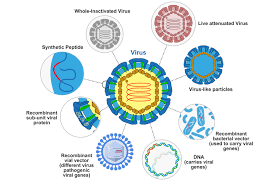Recombinant Vaccine Definition
In the most simplified terms, a vaccine is a biological preparation that provides active acquired immunity against a certain disease. Usually a vaccine consists of a biological agent that represents the disease-causing microorganism. It is often made from a weakened or killed form of the microorganism, its toxins or one of its surface protein antigens.
The first successfully case of vaccination was performed by Edward Jenner in 1796. He was the first to observe that individuals who caught cowpox, did not contract smallpox even when coming in direct contact with the disease1. An individual that has been vaccinated produces antibodies against the protein antigen that protect him/her from contracting the disease upon attack from the pathogenic microorganism.

Scientists take many approaches to design vaccines against a pathogenic microorganism. These choices are dictated by the nature of pathogen and the infection as well as practical considerations about the use of the vaccine. Some of the options include live attenuated vaccines, inactivated vaccines, DNA vaccines and recombinant subunit vaccines. See schematic below for an overview of the various approaches used to make a vaccine. This technical note discusses the basics of research and production of recombinant vaccines.
At GenScript, E. coli expression is routinely used for the production of high quality recombinant protein used in vaccine research applications. To see an overview of recombinant protein expression systems.
Additional information:
What is a recombinant vaccine in animal biotechnology?
Recombinant vaccines, a product of animal biotechnology, utilize genetic engineering. Scientists identify a pathogen's immune-triggering protein (antigen) and insert its gene into harmless bacteria. These bacteria then produce large amounts of the antigen, which is purified and formulated into a vaccine. This approach offers targeted protection, high purity, and scalability, making recombinant vaccines a valuable tool for safeguarding animal health.

What is the difference between a recombinant vaccine and a mRNA vaccine?
Recombinant and mRNA vaccines both train the immune system, but they use different methods. Recombinant vaccines deliver a pre-made protein antigen, while mRNA vaccines provide instructions (mRNA) for the body's cells to build the antigen itself. This difference translates to production speed (faster for mRNA) and the type of immune response triggered. Both offer valuable tools for disease prevention.

Both recombinant protein and DNA vaccines offer innovative immunization strategies, but they differ in the type of genetic material delivered:
Recombinant Protein Vaccine: This approach injects a pre-made protein antigen, the target molecule recognized by the immune system. Scientists engineer harmless bacteria to produce large quantities of this protein, which is then purified and formulated into a vaccine.
DNA Vaccine: In contrast, DNA vaccines deliver a plasmid containing the gene encoding the desired antigen protein. Once inside cells, the plasmid instructs cellular machinery to produce the antigen directly. The immune system then recognizes this self-made protein and mounts a response.
This difference translates to delivery methods: recombinant vaccines directly provide the antigen, while DNA vaccines rely on the body's own cells for production. Both types offer valuable tools for vaccination, with recombinant vaccines being established and DNA vaccines holding promise for faster development and potentially broader applications.
For any information about Gentaur vaccine, click here
